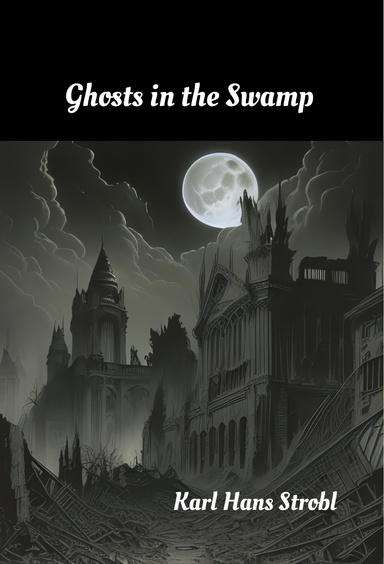By KARL HANS STROBL (Bandel Books; 1920/2024)
With his translation of this long-forgotten German epic, Joe E. Bandel (whose previous translations include fiction by Hanns Heinz Ewers and Paul Busson) can be crowned the premiere English language booster of early 20th Century horror-fantasy from Germany. Written by Karl Hans Strobl (1877-1946), whose reputation was permanently scarred by his involvement with the Nazi party, GHOSTS IN THE SWAMP functions as occult horror, avant-garde science fiction, visionary fantasy and philosophical allegory. It is, in short, unique, and has proven somewhat influential (with definite foreshadows of Boris and Arkady Strugatsky’s ROADSIDE PICNIC and THE DOG KING by Christoph Ransmayr).
Fair warning: this is not an easy read. It’s dense, poetic and disdains conventional storytelling. It also, I’m guessing, reads far better in its original language than in English (suggesting his political leanings weren’t the only reason Karl Hans Strobl’s work has gotten so little exposure in the non-German speaking world). Bandel does what he can translation-wise, but I find it hard to know what to make of lines like “She showed folds of thought and spirit to inspire confidence in her superiority.”
The setting is an alternate 1920 in which people wear stockings made of human skin and electrically charged belts, glass towers exist in which one can look down “through sixteen stories into an abyss of glass,” and a mysterious pestilence known as “Viennensis” has rendered Vienna a wasteland. Americans treat this decaying region as a sightseeing destination, with deep-pocketed patrons given tours of the city (you can probably guess that Strobl’s attitude toward us Yanks isn’t too positive). Among the participants of one such tour are the obscenely wealthy steelmaker Phoebus Gulliver and his rebellious daughter Selina, who has an annoying habit of disappearing unexpectedly. This is an especially unfortunate development, as the city has but a short time to go before becoming completely uninhabitable.
We also meet several people subsiding in the ruins of Vienna, including the mad doctor Lachnit, who uses his own daughter as an experimental test subject, the brilliant Schembera, whose ambitions are stymied by the fact that he lacks arms and legs, and the coffin dealer Franz, who becomes a most unlikely prophet. There’s also a disembodied telepathic brain, a haunted castle, cannibalistic tribes of “Earth Eaters,” masses of scattered corpses, toad-sized mutant spiders and this very book, whose increasingly apocalyptic narrative, in a very NEVERENDING STORY-esque touch, “will appear on the still blank pages as events progress.”
Only a few of those things are actually paid off. Strobl’s evident disdain for conventional storytelling ensures that despite a plethora of interesting concepts and promising set-ups the poetic and philosophical elements are what ultimately win out. Audacious and inventive this novel is, but reader-friendly it’s not.

